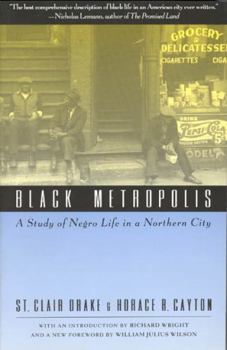Black Metropolis: A Study of Negro Life in a Northern City
Select Format
Select Condition 
Book Overview
Ground-breaking when first published in 1945, Black Metropolis remains a landmark study of race and urban life. Based on a mass of research conducted by Works Progress Administration field workers in the late 1930s, it is a historical and sociological account of the people of Chicago's South Side, the classic urban ghetto. Drake and Cayton's findings not only offer a generalized analysis of black migration, settlement, community structure, and black-white race relations in the early part of the twentieth century, but also tell us what has changed in the last hundred years and what has not. This edition includes the original Introduction by Richard Wright and a new Foreword by William Julius Wilson. "Black Metropolis is a rare combination of research and synthesis, a book to be deeply pondered. . . . No one who reads it intelligently can ever believe again that our racial dilemma can be solved by pushing buttons, or by gradual processes which may reach four or five hundred years into the future."--Bucklin Moon, The Nation "This volume makes a great contribution to the building of the future American and the free world."--Louis Wirth, New York Times "By virtue of its range, its labor and its insight, the book seems certain to become a landmark not only in race studies but in the broader field of social anthropology."--Thomas Sancton, New Republic
Format:Paperback
Language:English
ISBN:0226162346
ISBN13:9780226162348
Release Date:August 1993
Publisher:University of Chicago Press
Length:910 Pages
Weight:2.32 lbs.
Dimensions:8.5" x 2.0" x 5.5"
Customer Reviews
1 rating
A Classic
Published by Thriftbooks.com User , 26 years ago
Black Metropolis is perhaps the founding document of African-American studies, a classic work of sociology that still resonates today. It is a paradigmatic expression of the Chicago School of sociology, however, a school that today stands in some disrepute, at least in some circles. Indirectly, it was the target of James Baldwin's famous attack on Richard Wright in his essay, Everybody's Protest Novel. The claim of the criticism has been that the Chicago School, due to its insistance upon using a "scientific approach", merely reproduces the very terms under which African-Americans have been oppressed--a claim that has proceeded under the warrant of European intellectuals such as Theodor Adorno. Still, Black Metropolis is a landmark study, and, unfortunately, many if not most of its observations and conclusions remain true today, and in fact it could be argued that conditions in the Black Belt of Chicago have gotten worse, not better, since 1945, the year of Black Metropolis' publication--which lends a certain credence to the criticisms mentioned above, though perhaps it should be qualified by saying that they are not so much criticisms of the Chicago School as they are criticisms of American society. Since then, as we know, we have witnessed a great shift in American public opinion away from what some consider to be the excesses of those days; so much so, in fact, that the work of Black Metropolis may again be regarded as a profoundly useful book. Embodying American liberalism as it does--which counted as a grave sin thirty years ago--Black Metropolis may possibly be due for a fresh look.





